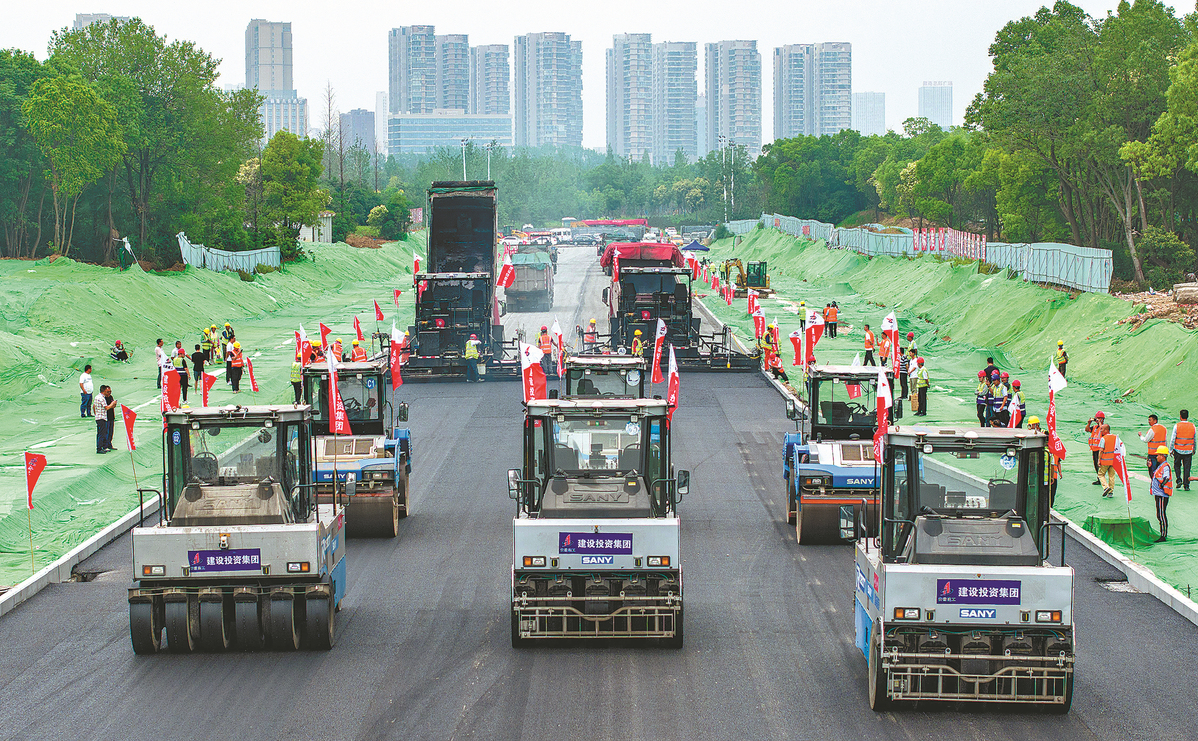Nation presses the accelerator on driverless vehicles


Tech advances, policy support point road to the future
Driverless vehicles may sound like something from science fiction, but they are racing into daily life sooner than many people expected, experts said.
These vehicles have immense potential to be a revolutionary technology to transform lives and open a new chapter in intelligent transportation, they added.
In some Chinese cities, robotaxis can now be hailed through ride-hailing apps for travel to destinations such as subway stations, commercial areas and residential communities. Users only need to input the pickup and drop-off points and the number of passengers. A few minutes later, a self-driving taxi approaches.
The commercialization of autonomous driving technology will gain momentum in China in the next few years, buoyed by continuous technological innovation and considerable policy support, the experts said, adding that the nation is at the global forefront of research and development and the use of such cutting-edge technology.
Chinese technology companies are stepping up efforts to accelerate the commercial use of self-driving vehicles.
For example, in March, local authorities in Beijing granted autonomous driving permits to tech giant Baidu and self-driving startup Pony.ai to run fully driverless robotaxis on open roads in the Chinese capital, with no driver or safety operator in the car.
The two companies are each allowed to provide up to 10 autonomous vehicles in a designated area of 60 square kilometers in Yizhuang, a southern suburb. In case of emergency, a remote safety supervisor takes control of the vehicle via an online assistance platform.
Baidu recently announced it had obtained licensing for commercial operation of its fully driverless ride-hailing service in Shenzhen, Guangdong province. Its robotaxis are authorized to provide such a service with no safety operator in the car. With this new license, Baidu's Apollo Go robotaxis will be allowed to operate across an area of 188 sq km in Shenzhen from 7 am to 10 pm daily.
This year, Baidu plans to put an additional 200 fully autonomous driving robotaxis into operation nationwide and build the world's largest fully driverless ride-hailing service area. Robin Li, co-founder and CEO of Baidu, said the company aims to expand services on its autonomous ride-hailing platform Apollo Go to 65 cities in 2025, and to 100 cities in 2030.
"The massive cost reduction will enable us to deploy tens of thousands of autonomous vehicles across China. We are moving toward a future where taking a robotaxi will be half the cost of taking a cab today," Li added. Apollo Go currently covers more than 10 cities in China, including Beijing, Shanghai, and Guangzhou and Shenzhen in Guangdong.
In recent years, China has introduced a series of policies to promote the development and commercialization of self-driving technology. In November, the Ministry of Industry and Information Technology and the Ministry of Public Security unveiled a draft guideline to expand road tests for autonomous driving vehicles nationwide.
In August, China released its first national draft guideline on the use of self-driving vehicles for public transportation. That month, authorities in Wuhan, Hubei province, and Yongchuan district, Chongqing, granted Baidu the first permits issued in China to charge fares for fully driverless ride-hailing services in designated areas.
As autonomous driving technology continues to mature, the sector is poised to consolidate in coming years. A report by global consultancy IHS Markit said the market size of China's self-driving taxi services is expected to surpass 1.3 trillion yuan ($181.5 billion) by 2030, accounting for 60 percent of the ride-hailing market nationwide.
Lyu Jinghong, an analyst of intelligent mobility at research company BloombergNEF, said, "Continuous testing on public roads, eased regulations, as well as cost reductions in autonomous vehicle manufacturing, will help accelerate the deployment and commercialization of self-driving cars."
Noting that China has caught up with the United States in developing autonomous driving, Lyu said clear regulations at national level will encourage local governments and autonomous driving companies to quicken the use of self-driving technology, which is crucial for achieving commercialization targets.
BloombergNEF's 2022 Electric Vehicle Outlook said China will operate the world's largest robotaxi fleet with some 12 million autonomous vehicles by 2040, followed by the US, with about 7 million such vehicles.
Other Chinese tech companies, such as Pony.ai, WeRide and Didi Autonomous Driving, the self-driving technology arm of Didi Global, are stepping up efforts to launch self-driving taxi services in an attempt to bolster large-scale commercial use of growing transportation solutions.
In April, Pony.ai announced it was the first and only company to receive a permit to operate fully driverless robotaxi services in an 803 sq km area in the Nansha district of Guangzhou.
























